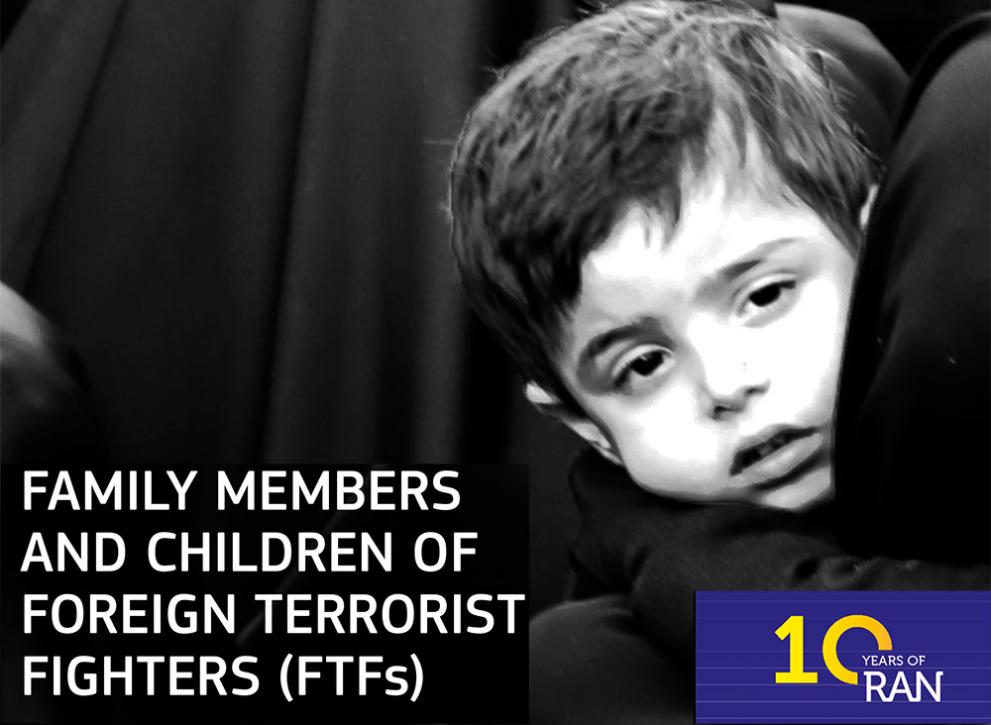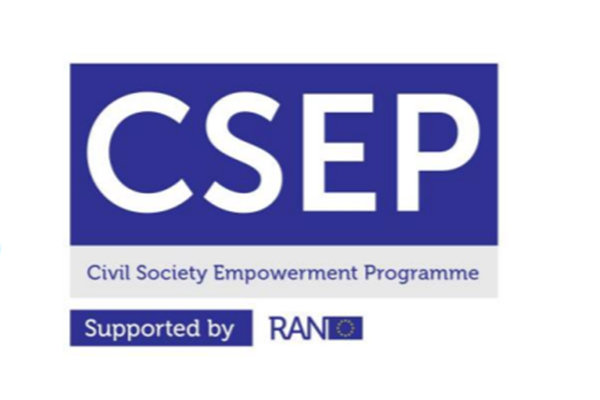
Over the past few years European Member States have been faced by the challenge of returning Foreign Terrorist Fighters (FTFs), who continue to return in small numbers. Much of our P/CVE work has centred on how to handle FTFs, including how to rehabilitate and reintegrate them and their families back into European society. One of the more challenging aspects of this work is how to reintegrate children of FTFs, which is the focus of this month’s RAN Practitioners Update.
The Update features a Spotlight magazine, which contains articles and interviews from practitioners that span each area that affects the life of a child returning from such troubled circumstances life: their families, their schools and education, their local communities and their psychological situation. The Update also continues to look ahead to the upcoming High Level Conference and Plenary, whilst it also includes the latest film from the 10 Year Anniversary series, this time highlighting RAN’s achievements since its foundation.
Children of Foreign Terrorist Fighters (FTFs)

Spotlight
The latest edition of the RAN Practitioners Spotlight magazine features a series of articles, case studies and interviews with practitioners and Working Group leads highlighting their work with children of Foreign Terrorist Fighters. The magazine hears about the work of practitioners from a number of different fields relevant to the life of these children. These include: the importance and role of their families, the challenges faced in schools and education, their place in local communities, their general rehabilitation and their recovery from a psychological perspective.

Female Returnees and their Children
The latest edition of the RAN Practitioners Spotlight magazine features a new article from psychotherapist and practitioner Kerstin Sischka (Violence Prevention Network). The article looks at psychotherapeutic perspectives on the rehabilitation of women and children from the former territories of the so-called Islamic State, identifying the important position that women and children are given in the ideology of radical political, or religious groups.
High Level Conference & RAN Plenary
Film
This new film is the latest in the series commemorating the 10 Year Anniversary of the RAN’s foundation. A mixture of animation and real-world footage, the film highlights the main achievements of RAN and its practitioners over the last decade, as it continues to address the evolving and emerging terrorist and extremist threats.
High Level Conference and Plenary
The dates for the RAN High Level Conference & RAN Plenary are confirmed as:
- The High Level Conference 2021 (10 Years of RAN) will take place on Tuesday 12 October 2021 (afternoon)
- The Plenary 2021 will be held on Wednesday 13 October 2021.
Both events will be in an online format. Please check the RAN Website and your mailbox for more information relating to it.
Online Campaign in P/CVE

RESULTS & LESSONS LEARNED OVER THE FOUR YEARS OF THE CIVIL SOCIETY EMPOWERMENT PROGRAMME
Over the past four years, the Civil Society Empowerment Programme (CSEP) has supported 20 diverse projects in their online P/CVE campaigns across the EU Member States. In a series of five webinars, these EU-funded projects will share their results and lessons learned. If you want to learn more about the results of these different online campaigns, how to start your own online campaign, what is being done in your country, or generally more about P/CVE campaigns, join us at one or more upcoming webinar.
Upcoming events
Due to the global COVID pandemic, RAN Practitioners will continue to deliver all meetings in the coming months online.
For more information on planned meetings please go to the RAN website. A number of other meetings planned for the first few months of 2021 will be published in due time.
- Conferences and summits
- Zagreb, Croatia
- External event
- Conferences and summits
- Lisbon, Portugal
- Conferences and summits
- External event
Publications
Dealing with returning children and their mothers from Daesh: taking stock and going forward
A new paper based on the RAN FC&S multi-meeting held on 19-20 May 2021. The meeting addressed the topic of children and their mothers returning from previously Daesh-controlled territory. The meeting served as an opportunity to assess the current state of play as regards child returnees and their mothers and to explore the type of structures that can help practitioners support them. The meeting gathered 31 practitioners, including social workers, local P/CVE coordinators, psychologists/psychiatrists, teachers and returnee coordinators, who have experience in working with returning children and their mothers. This conclusion paper first presents the main lessons learned and the highlights of the discussion and concludes with recommendations formulated by practitioners. Read more...
Repatriated foreign terrorist fighters and their families: European experiences and lessons for P/CVE
A new paper presents an overview of approaches towards the management of repatriated foreign terrorist fighters and their families in EU countries and in the Western Balkans, with concrete examples of practices, multi-agency and coordination mechanisms as well as exit programmes and interventions for both adult and child returnees. The paper concludes with a series of existing challenges and presents key learnings on institutional cooperation, local level measures and individual reintegration. Read more...
Challenges and solutions when working with families of Foreign Terrorist Fighters
This paper highlights the challenges that family members “left behind” by FTFs who left for Syria and Iraq are encountering in their daily life, such as psychological issues, dealing with authorities, stigmatisation and/or practical and legal issues. The paper provides practical tips for solution-focused interventions by practitioners working in family support, looking also at adjacent fields in order to respond to these challenges. This paper draws on a RAN Families, Communities & Social Care Working Group meeting held on 29 and 30 June 2020. Read more...
Contemporary manifestations of violent right-wing extremism in the EU. An overview of P/CVE practices.
A new paper that looks at the trend of rising right-wing violence across the EU, illustrating the need for adequate measures to prevent and counter the threat. This paper explores whether measures to deal with previous right-wing extremist expressions are fit to counter current manifestations of right-wing extremism. It describes the modern (violent) right-wing extremist scene and how it has evolved from past manifestations. It also highlights a number of promising practices from previous programmes targeting right-wing violence. Read more...
Conspiracy narratives and right-wing extremism – Insights and recommendations for P/CVE
A new paper highlights the proliferation of conspiracy narratives and their link to violent right-wing extremism. It highlights the archetypal narratives of conspiracy ideologies, providing ‘black and white’ world views and how they foster societal divisions between in-groups and out-groups by exacerbating intolerance against ‘the other’ and delegitimising different voices as being part of the conspiracy. The paper provides recommendations for practitioners in tackling the conspiratorial labyrinth of conspiracy narratives. Read more...
Ethical guidelines for working on P/CVE in mental health care
This new paper describes the task of mental health professionals working in the context of preventing and countering violent extremism (P/CVE) and provides guidance on how this can be undertaken to be consistent with ethical practice. In the section on Ethical Dilemmas, the key concerns of psychiatrists, psychologists and psychiatric nurses in relation to this work are identified and addressed. These concern their dual responsibility towards their patients and the wider public, the challenges of breaching confidentiality and sharing information, the dangers of pathologising beliefs, and the importance of ensuring that their practice is evidence-based and does not take them beyond the limits of their competence as mental health practitioners. Read more...
Risk assessment in prison
This paper provides a picture of risk assessment tools used in EU Member States both in the prison and security contexts. It focuses on existing instruments, their content and how they are used at the moment. The goals of such assessment and the challenges for the future in this field are also mentioned. Read more...
Contact Us
RAN Practitioners is implemented by RadarEurope, which is a subsidiary of the RadarGroup:
- Phone: +31 (0)20 468 06 08 (office)
- E-Mail: ran
 radareurope [dot] nl (ran[at]radareurope[dot]nl)
radareurope [dot] nl (ran[at]radareurope[dot]nl)
Would you like more frequent updates on RAN’s activities? Gain access to all public RAN papers as they are published, other RAN news and thought-provoking articles on the radicalisation process by following RAN on:
